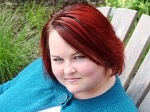Today’s featured debut author is Juliette Sobanet, a French professor who writes fun, sassy women’s fiction with (you guessed it!) a French twist. Thanks, Juliette, for a terrific chat — and, by the way, I just LOVE the book cover!
 Name: Juliette Sobanet
Name: Juliette Sobanet
Name of book: Sleeping with Paris
Book genre: Chick lit/Humorous women’s fiction
Date published: October 8, 2011
Publisher: Self-published (though Amazon and Barnes & Noble)
What is your day job? French professor
What is your book about? Charlotte Summers is a sassy, young French teacher who is two days away from moving to Paris with the love of her life and from fulfilling her dream of studying at the prestigious Sorbonne University in France. But when she discovers her fiancé’s online dating profile and has a little chat with the busty redhead he’s been sleeping with on the side, she gives up on committed relationships altogether and decides to navigate Paris on her own.
Determined to stop other women from finding themselves in her shoes, Charlotte creates an anonymous blog on how to date like a man in the City of Love—that is, how to jump from bed to bed without ever falling in love. But, with a slew of Parisian men beating down her door, a hot new neighbor who feeds her chocolate in bed, and an appearance by her sleazy ex-fiancé, she isn’t so sure she can keep her promise to remain commitment-free.
Why did you want to write this book? I spent a year in Paris completing my Master’s degree and accumulating all sorts of fun, exciting, and sometimes bizarre experiences that I knew I’d want to write about one day. I’ve also been an avid reader and writer since I was young, and after I completed my Master’s in France and returned back to the States, I knew it was time to write the story that had been swimming around in my head and was dying to come to life on the page.
So, using some of my own life experiences and my time in France as inspiration (and then exaggerating it all, of course!), I came up with the concept for Sleeping with Paris. My goal in sending this story out into the world is that readers will find a book that they can relax with at the end of a long day, laugh out loud, fall in love with a sexy French hero, romp around France, crave a little chocolate, and fall asleep with nothing too heavy on their minds.
What would you say is the most challenging part of writing a book? Editing and rewriting. It is so difficult to swipe whole scenes, whole sections of your draft and start over again. But to have a solid final product, it simply must be done. Still though, acknowledging what isn’t working in your story and being willing to scrap it is no easy task.
Did you conduct any kind of research in order to write Sleeping with Paris? I studied abroad in Lyon for six months during undergrad and then completed my Master’s in Paris. My time in France helped me to create an authentic view of the setting and the characters from the viewpoint of a young, newly single, sassy heroine. Also, in this novel, I explore issues that all women have dealt with from time to time: love, broken hearts, infidelity, the importance of friendships, family relationships, and career aspirations. Drawing from some of my own personal experiences and from those of my friends as “research,” I hope that women (or men) who read this novel will be able to identify with some of the characters and their problems, while still having a ball romping through Paris!
What motivates you to write? I guess it goes without saying, but I love writing. It’s something I’ve always felt drawn to, ever since I was a little girl. I have stacks of journals saved up underneath the bed, and I’ve been creating stories whether on the page or in my head since as long as I can remember. I love that each writer has a unique story to tell, and with Sleeping with Paris, I was able to tell mine. Well, the first of mine, that is. There are many, many more stories in me. This is only the beginning! So, to properly answer your question, I’m motivated to write because with the exception of drinking wine on a cobblestone street in France, there’s nothing I’d rather be doing!
Did you experience writer’s block? I don’t think I’ve ever experienced full-on writer’s block. Of course, I’ve had those moments where I’ve stared at the screen and wondered, “What next?” But thankfully, for me, that is only temporary. I figure it’s better to at least get some words down on the page (even if they’re not the greatest) than to write nothing at all. That’s what editing is for!
 How long did it take you to write this book? I began the first few chapters in December of 2006, but I really got down to business and wrote the whole first draft in spring of 2008. Two years of editing, revising and rewriting later, in the summer of 2010, I had a finished product. And just before publication, I went in for another round of edits. You see? The editing never ends until publication!
How long did it take you to write this book? I began the first few chapters in December of 2006, but I really got down to business and wrote the whole first draft in spring of 2008. Two years of editing, revising and rewriting later, in the summer of 2010, I had a finished product. And just before publication, I went in for another round of edits. You see? The editing never ends until publication!
Why did you decide to self-publish? Last year, after Sleeping with Paris won first place in the Washington, D.C. Romance Writer’s Marlene Awards, I signed with my agent, polished up the manuscript and got it ready to send to New York. We went on submission with this novel last fall, but because of the trend away from this type of light women’s fiction/chick-lit, the book didn’t sell. Thankfully, even though we didn’t find a place for this story going the traditional route, I did receive positive editorial feedback, so I didn’t give up hope in finding a home for my first book. I recently began paying attention to the massive rise in self-publishing and saw it as a fantastic opportunity to get my work out there and gain a readership. And so I took the plunge and am so happy that I did! It took a lot of courage to get to this point, but I wouldn’t do it any differently.
Was the self-publishing process easier or more difficult than you thought it would be? Some aspects were easy breezy, while others definitely had me reaching for the wine bottle… J Overall, though, it was quicker and more fun than I could’ve anticipated. The positive reader feedback I’ve been getting since publication has made it all worth it.
What is the biggest misconception about writing a book? That after you finish your first draft, you are almost finished. Writing the words “The End” is really just a sign that now the real work must begin. That’s when you find out that everything you wrote (or at least some of it) isn’t as fabulous as you thought . . . and then it’s time to revise and rewrite!
What was your favorite aspect of the writing process for this book? I loved the very beginning, before I had a clue what I was doing! Transferring those raw ideas to the page in any way I wanted, without worrying about “the rules.” Letting the creative juices flow, so to speak. There’s nothing more fun than that!
What tools/methods have you employed to promote your book? What advice would you give to writers regarding promotion? I’ve been blogging and using Twitter and Facebook on a regular basis as a means of promotion. I’ve also been doing interviews (like this one), have created an author profile on Goodreads, and have posted a bit on the Kindle Boards Forum. There is an endless amount of things that can be done for promotion, so the trick is to prioritize and not allow all of the promotion to steal too much time away from your writing!
How has life changed for you since the publication of your book? At first, I was so excited, busy and tired that I thought my head was going to spin off! Things are calming down a bit now, but the best and most rewarding change has been having new readers come across my book, read it, and tell me that they enjoyed it. I can’t even describe how happy that has made me.
Do you find yourself obsessively checking sales stats? Guilty as charged. Amazon updates them almost hourly, which is both helpful and a time-sucker!
You mentioned you have lots of books in you. When do you plan on writing the next? I’ve already completed a second book, called Kissed in Paris, and I am currently at work on edits for my third novel, a magical women’s fiction with a hint of mystery, called Dancing with Paris. And when this one is finished, I plan to keep on writing!
My favorite last question: Oprah once famously said that there is no such thing as luck, without preparation and a moment of opportunity. Would you agree or disagree with regard to your own success as a writer? I completely agree. We all have dreams and aspirations, but I do believe that we must do our best to work toward them, to prepare in any way that we can. With writing, that means spending a ton of time . . . writing! Then rewriting. Then asking others to read and critique our work. Then editing and revising again! The process never ends. It can be long, exhausting and time-consuming, but you won’t become a solid writer without putting in the time and effort. And then, like Oprah said, there will come a moment of opportunity, and if you’ve been working hard, hopefully you’ll be ready to jump in and take it.
 I finished In the Red after a looong four years, and, unfortunately, realized that it wasn’t as good as I wanted it to be. It needed some major revisions, and I decided that, rather than doing that, which would take quite some time, I would instead start writing Baby Bailino, the sequel to Baby Grand. This was in late 2014.
I finished In the Red after a looong four years, and, unfortunately, realized that it wasn’t as good as I wanted it to be. It needed some major revisions, and I decided that, rather than doing that, which would take quite some time, I would instead start writing Baby Bailino, the sequel to Baby Grand. This was in late 2014.

 Name: Juliette Sobanet
Name: Juliette Sobanet



